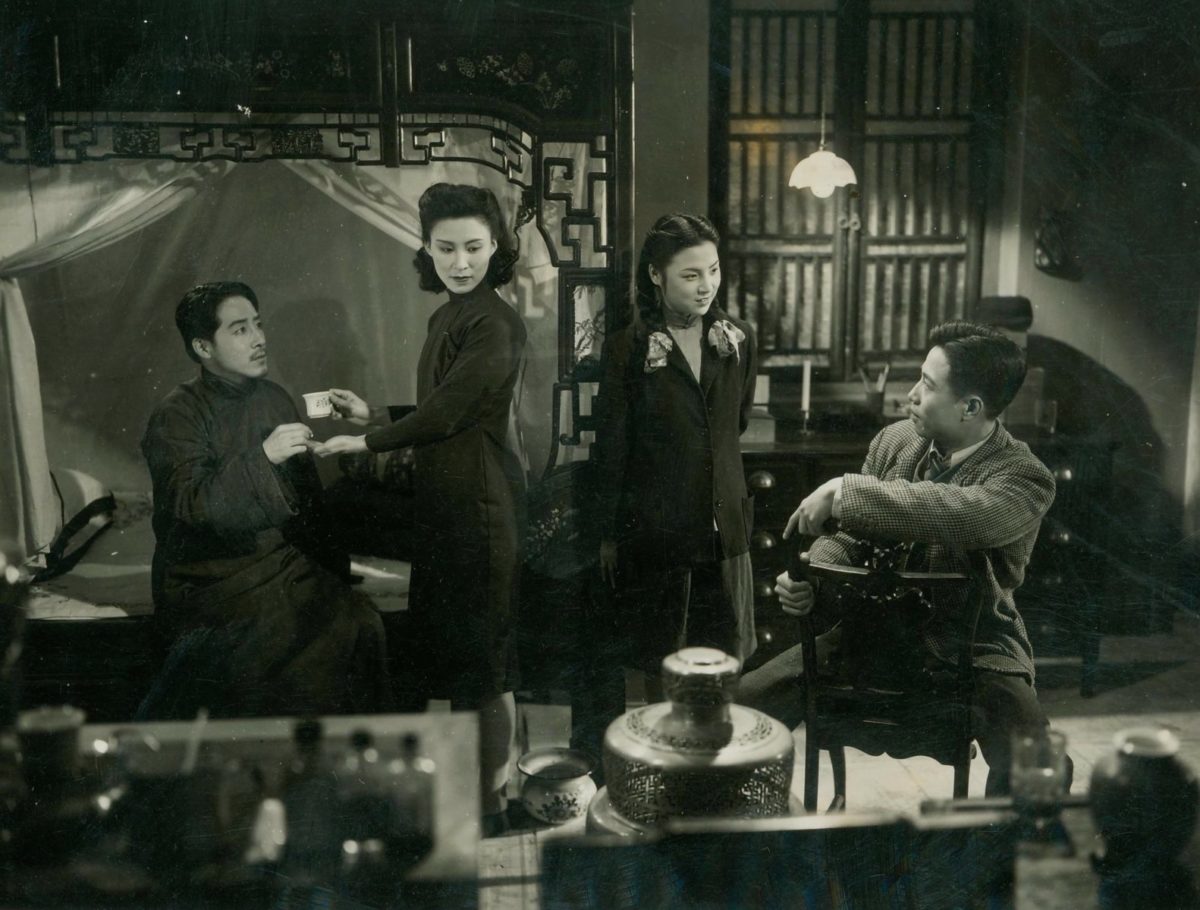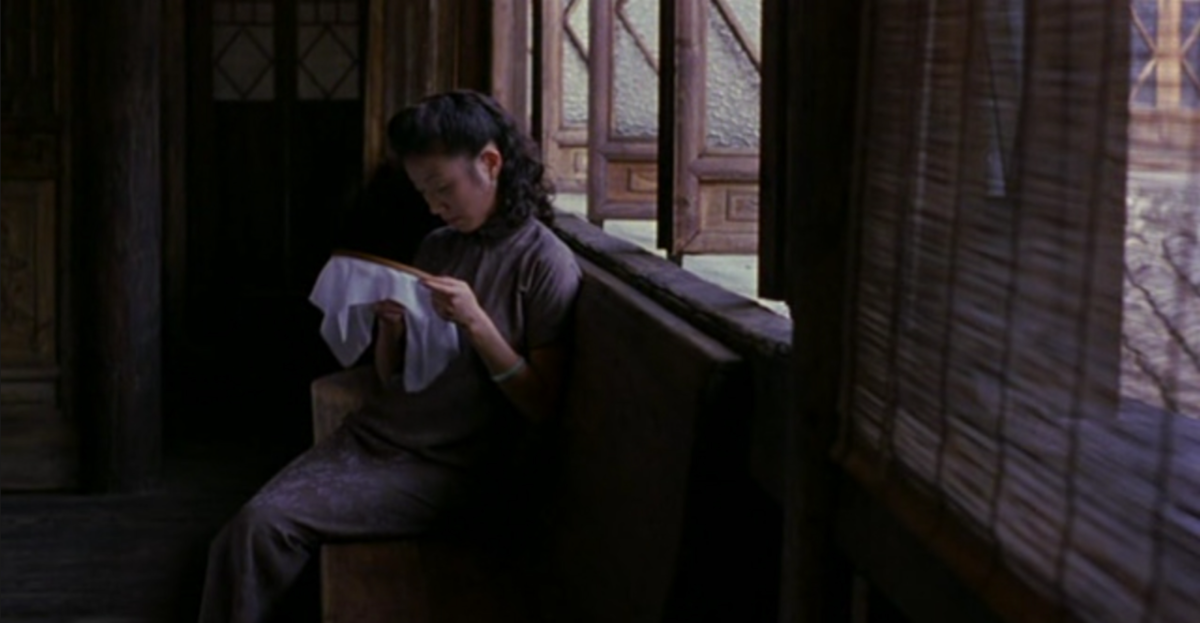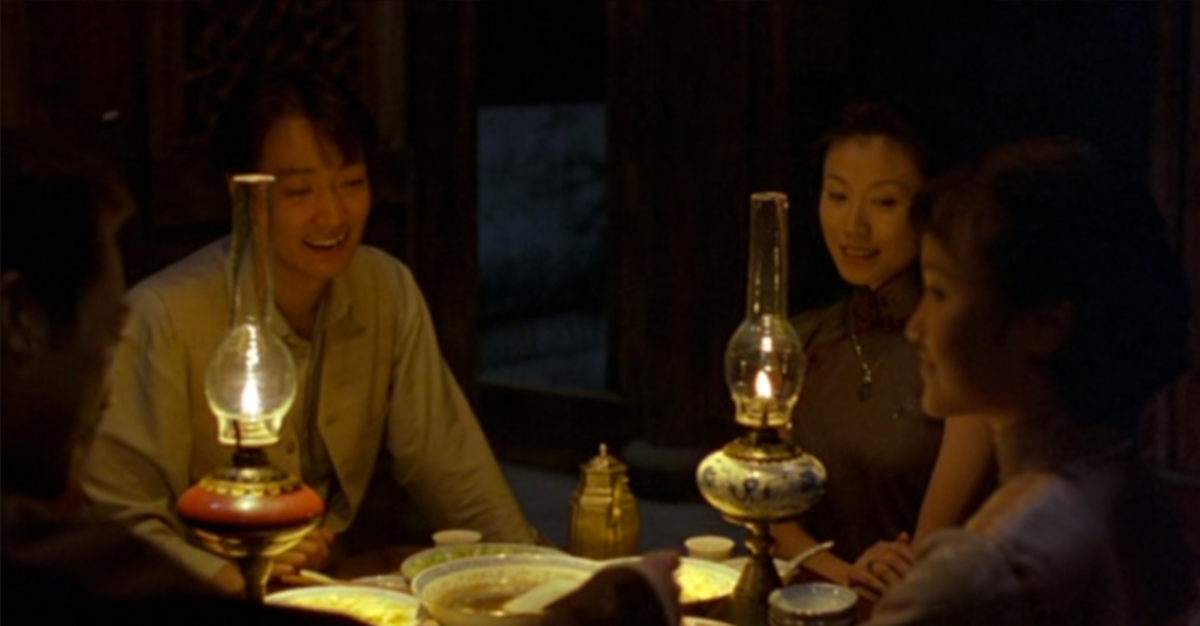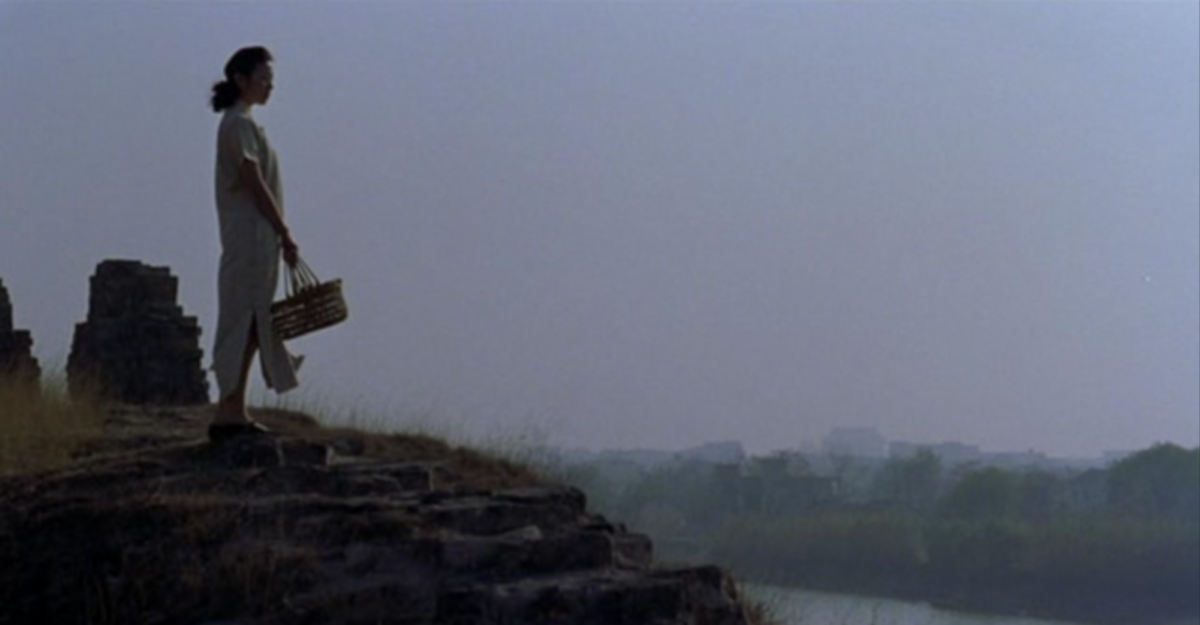It is uncommon, to say the least, to remake a classic in order to extend an olive branch to the political authorities. But that is exactly what China’s Fifth Generation filmmaker Tian Zhuangzhuang did with his 2002 film, Springtime in a Small Town. Returning to filmmaking after a ten-year ban following his previous film, The Blue Kite (1993), which directly addressed the traumatic national history during the Mao era, Tian chose to remake Fei Mu’s Spring in a Small Town (1948). Both Fei’s original and Tian’s remake are often read as political allegories of China’s situation at significant historical junctures.Woodland, Sarah. ‘History Repeating in Spring in a Small Town’. In Remaking Gender and the Family: Perspectives on Contemporary Chinese-language Film Remakes, 103-28. Leiden: Brill, 2018. But the 2002 remake is also a personal allegory of Tian’s own fraught relationship with filmmaking in China and his tribute to Fei’s legacy.
Having run afoul of censors with his previous film, Tian made a safer bet producing a remake rather than taking on an original project. “I didn’t want the film to have any trouble,” the director explained in a 2002 interview.Tian, Zhuangzhuang. ‘Dialogue with Tian Zhuangzhuang about Remaking Spring in a Small Town’. By Li Jiazhang. Cinematic Creation, no. 4 (2002): 70 (in Chinese). From today’s standpoint, Tian’s choice of Spring as his comeback vehicle almost seems obvious—the censors would have had a hard time dismissing one of the most celebrated films of their country. Fei’s innovative film language has been cited as an influence by nearly every prominent director of Sinophone cinema: from Jia Zhangke and Wong Kar-wai to Zhang Yimou and Stanley Kwan. Scholars and critics such as James Udden have argued that Fei’s cinematic achievements have equaled those of Kurosawa, Antonioni, Bresson around the same time.Udden, James. ‘Poetics of Two Springs: Fei Mu versus Tian Zhuangzhuang’. In The Poetics of Chinese Cinema, edited by Gary Bettinson and James Udden, 78-95. New York: Palgrave Macmillan, 2016. Moreover, when Hong Kong critics voted in 2005 to select the best Chinese films of all time in celebration of the centennial history of Chinese cinema, Spring in a Small Town topped the list. But these honors only came after Tian’s remake, the latter partly paving the way for the former.
Set in 1946 just after the Second Sino-Japanese War, Spring revolves around the moral dilemma of Zhou Yuwen, whose erstwhile lover Zhang Zhichen comes to visit his childhood friend Dai Liyan, who is also her aristocratic husband. The ailing Liyan eventually realizes that his estranged wife and his old friend still have feelings for each other, and the trio are caught between a conflict of passion and propriety. The story concludes with Yuwen recommitting herself to Liyan after his attempted suicide and Zhichen taking his leave. Following its release, critics denounced the film for “lacking…thought, [being] empty and boring” and having “petty sentiments,”Xiangqian. ‘Review of Spring in a Small Town’. Juying Chunqiu 1, no. 3 (1948): 108. at a time when the nation was embroiled in a civil war between the Communists and the Nationalists. Fei died of a heart attack just three years after making the film and, subsequently, his name and work sank into oblivion for more than 30 years.

Spring was eventually rediscovered in Hong Kong in the early 1980s and has since been hailed across the Sinophone world for its cinematic modernism, including Yuwen’s voice-over narration, dynamic editing, and expressive cinematography. Fei starts the film with a tracking shot following Yuwen on the city wall, accompanied by her voice-over narration. As she explains how her eyes see nothing and mind becomes empty when walking there—as if “floating out of the world”—the camera slowly follows her walk into Fei’s signature low-angle shot, framing her against the clear sky. Later at the same location, Fei frames Yuwen and Zhichen in the same way against this empty background, temporarily isolated in a world of their own. Yuwen passes on to Zhichen Liyan’s wish to see him marry his sister Dai Xiu, a proposal that Zhichen finds implausible, citing that the latter is too young. When Yuwen points out that Dai Xiu is turning sixteen today, Zhichen falls silent for a moment before he asks, “The year I left, weren’t you also sixteen?” The visual accompaniment to this dialogue is a slow dissolve which displays two pairs of the same characters, as if indicating to audiences what is and what may have been for the former lovers. Through such stylistic and formal decisions, Fei sought to reveal the characters’ mental life beyond the surface—an emotional reality. If Spring was criticized for the ideological indifference of its story during Fei’s lifetime, now it is lauded for its stylistic subtlety and expressiveness.
But it wasn’t until the arrival of Tian’s 2002 remake with English subtitles that Spring truly started to receive due recognition outside the Chinese-speaking world. Western critics such as The Guardian’s Peter Bradshaw, for example, became aware of Fei’s original via Tian’s remake, which premiered at Venice and won the San Marco Prize for best film in the alternate competition. With Springtime, Tian pays homage to and (re)ignites interest in the original. “With this film, the producers wish to pay their respects to China’s pioneering film-makers,” Springtime states before its title sequence. While the Chinese titles of the two films are identical, the English title of the remake has a slight difference, so as not to confuse audiences and overshadow the predecessor to which it is paying tribute.
Paradoxically, in this quest to win international honors and draw attention to Fei’s classic, Tian chose to, or perhaps had to, “ruin” Spring. To make a low-budget, festival-oriented art film that would circulate well globally, especially on the international film festival circuit, Tian dispenses with Fei’s avant-garde modernist aesthetics. Yuwen’s voice-over is completely omitted, and with it, the viewer’s access to her introspection and seemingly omniscient mind in the original. The expressive editing techniques—fade-ins, fade-outs, and slow dissolves—are replaced with straight cuts. Long-take tracking shots and extreme long shots substitute for the various camera distances and movements Fei employed in Spring. All these changes adhere to the characteristics of the so-called international festival film, i.e., minimally-edited, long-take/shot realist works with limited use of music and even dialogue. Such films from China and Iran have a proven track record of finding favor with international festival juries since the 1980s.Nichols, Bill. ‘Discovering Form, Inferring Meaning: New Cinemas and the Film Festival Circuit’. Film Quarterly 47, no. 3 (1994): 21. https://doi.org/10.2307/1212956. This is the path that Tian follows. He strove for objectivity and a certain distance from the story, and his interviews suggest that he was acutely aware of his stylistic compromises as well as the impending criticism that would soon follow. When asked why he chose to remake Spring and whether he believed it had defects to be remedied, Tian answered, “I thought someone has to remake this sooner or later. Someone will ruin it. Let it be me.”Tian, Zhuangzhuang. ‘Dialogue with Tian Zhuangzhuang about Remaking Spring in a Small Town’. By Li Jiazhang. Cinematic Creation, no. 4 (2002): 70 (in Chinese).

At the same time, Tian borrows the legitimacy of Fei’s classic to allegorize his personal experience as a filmmaker in China. The contents of the two films have small, but significant differences. Tian not only represents the story in his own way, thus making the aforementioned technical changes, but he also tells a different story. Through minute changes in the narrative and visual storytelling of Springtime, Tian fundamentally modifies the relationship between Yuwen and Zhichen, as well as the hopeful ending of the original. Crucial scenes that establish relationships between the characters in Spring, especially between Yuwen and Zhichen, are either omitted or significantly altered. One such scene absent in the remake is that of Dai Xiu singing for Zhichen on the evening of his arrival. A deep-staged medium shot shows Yuwen preparing medicine for Liyan in the foreground and Zhichen, who can’t keep his eyes off her, in the background inattentively listening to the song. The camera turns left as Yuwen walks up to Liyan to give his medicine and turns back as she returns to sit down, facing Zhichen and Dai Xiu. With her back towards the camera, it becomes impossible to know if she returns Zhichen’s look. Given Dai Xiu’s dissatisfied expression at being ignored by Zhichen, she perhaps does look back, but Fei’s carefully choreographed scene firmly embeds uncertainty and ambiguity in the narrative.
Indeed, all such looks—stolen glances, mild yet expressive gestures, and double entendres—create the intense atmosphere in both films. But many of these instances are not afforded to Yuwen and Zhichen in Tian’s film. The famous boat scene is another example. In Fei’s version, with various shots distances, the Dai siblings sit in the bow singing a song, Yuwen behind them, and Zhichen stands in the stern, allowing the latter pair to glance at each other. The viewers observe how the two miss and meet the other’s look. By comparison, the whole scene is captured in one long-take tracking shot in Springtime, in which the sister sits in the bow, the spouses together behind her, and Zhichen alone in the back. No uneasy exchange of glances is present and, even if they were, the camera is too far away for the audience to tell. Moreover, the character of Zhichen is generally more impulsive and less likable in Tian’s version. At Dai Xiu’s birthday dinner, Yuwen and Zhichen get drunk and nearly fulfill their repressed passion that night in the latter’s room. But Zhichen runs outside in the final moment, locks Yuwen in, and refuses to open the door. She breaks the glass on the door to unlock it and cuts her hand. Whereas Zhichen the doctor treats Yuwen’s hand in Fei’s original, in Tian’s remake it is Liyan. In a medium shot under harsh chiaroscuro lighting, Liyan carefully applies salve on her hand as he says, “I ought to get better, so we can live with hope in our hearts again.” Standing next to his bed, Yuwen tearfully asks, “Why are you telling me all these things?” And, with the silence between them, she sits next to Liyan on his bed. Yuwen attempts breaking the boundaries of propriety and fidelity and, as a result, experiences trauma that Liyan is tending to. Tian, as a director, has little sympathy for Zhichen.

The endings of the two films also provide a marked difference. Following Liyan’s attempted suicide, Zhichen takes his leave from the Dai household. In the final scene, similar to the opening of Spring, Yuwen watches Zhichen walk away from the top of the city wall. What’s different and significant this time around, however, is that Liyan joins her on the wall, entering her solitary spot and deep subjectivity that he had no place in before. The film ends with Yuwen pointing to a distance for Liyan to see a future with hope in their hearts. Whereas in Springtime, neither spouse sends Zhichen off as he departs. Liyan tends to a barren tree in his yard, which may be too frail to revive, and Yuwen continues her embroidery on the second floor—exactly where she was when Zhichen arrived. The penultimate long shot shows Yuwen sitting by the windows, framed or caught between doors, as she hears the train whistle in the distance. The image then cuts to an extreme long shot of the city wall, recalling the pan across the wall at the very start of the film, and lingers for several seconds until a fade-out. Nothing has changed, the ending scenes seem to suggest, in terms of Liyan and Yuwen’s marriage. But whereas Yuwen willingly recommits herself to Liyan in Fei’s version, Tian’s ending evokes only melancholy.
The changes in the characterization of Zhichen and Liyan as well as Yuwen’s relationship with them serve to better symbolize Tian’s own dilemma as a Chinese filmmaker. If Tian identifies with Fei and his courage to stay the course in a highly politicized era, he seems to identify even more with his protagonist Yuwen. In Spring, Zhichen and Liyan—a Western-trained stethoscope-carrying doctor who wears a suit and a fedora, and the psychosomatic last male heir of a declining aristocratic family—serve as metaphors for China’s paths to choose from: the modern future or the feudal past. Though it has a long tradition in the history of Chinese films, such national allegory through women’s story doesn’t quite register as strongly in Springtime. Instead, the two male characters seem to embody choices in the filmmaking career of Tian, the last bastion of Fifth-Generation cinema. By then, Tian’s old classmates from the Beijing Film Academy had already chosen “Zhichen,” so to speak. Zhang Yimou made his wuxia epic, Hero, and Chen Kaige made his English-language erotic thriller, Killing Me Softly, both also released in 2002. To “give in” to external financial and ideological pressures or buck the trend by holding fast to one’s creative principles—that is the question.
Ultimately, Tian chooses the latter. Springtime in a Small Town proves to be an intersection of past and present, creation and compromise, homage and lament. He treads lightly by turning to a well-respected source material that the authorities welcomed, but this olive branch turned out to be thorny, pricking his hands. In Springtime, Tian replaces the original’s avant-garde cinematic techniques with those of the international festival circuit t0 gain cultural capital and bring Fei’s Spring into the spotlight abroad. Dissatisfied with the endeavor, he adopts a rhetoric of failure and uses the word “ruin” to describe his remake. This cheerlessness permeates the story, as Tian makes narrative changes to the original to allegorize his love-hate relationship with film. As someone who lived through the “hopeful” future that Yuwen and Liyan expect—the subject of his previous banned film—Tian knows full well that no such thing ever existed. Moreover, his vision for his future as a filmmaker is equally bleak. As Yuwen chooses Liyan over Zhichen, Tian opts for this slow, exquisite, and haunting portrayal of restraint while his Fifth-Generation peers turn to commercial movies at the turn of the century. But to remain dedicated to arthouse filmmaking is not a triumph for him per se, just as the heroine of his film appears dejected to stay with her husband. If the Yuwen of Spring was a symbolic China that chose to follow tradition while looking ahead to the future, what does the Yuwen of Springtime stand for more than half a decade later? Tian seems to say once more, “Let it be me.”
